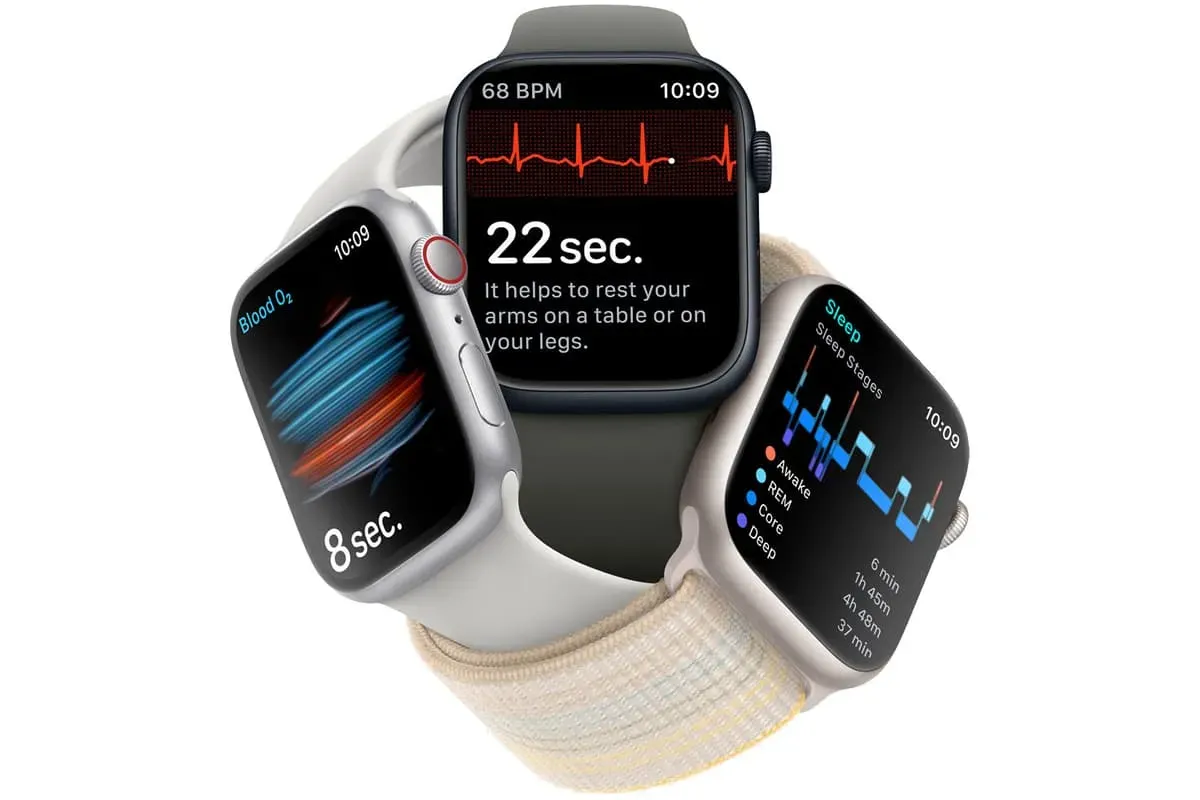In recent years, smartwatches have emerged as a promising tool in the fight against heart disease, which remains the leading cause of death in America. With their advanced features, these wearable devices not only track daily activities but also monitor vital health metrics crucial for heart disease prevention. The integration of innovative technology in the best smartwatches allows users to gain insights into their cardiovascular health, helping to identify potential risks before they escalate. By analyzing data such as heart rate, sleep patterns, and physical activity levels, smartwatches empower individuals to make informed lifestyle choices that contribute to better overall health. As we delve deeper into the role of wearable technology, it becomes evident that these devices could be instrumental in reducing the alarming statistics associated with heart disease.
Wearable devices, particularly smartwatches, are revolutionizing how we approach cardiovascular wellness. These gadgets serve as more than just timepieces; they are vital health companions that provide users with real-time insights into their bodily functions. By monitoring heart rates, sleep quality, and physical activity, smartwatches can significantly aid in heart disease prevention and management. As individuals become more health-conscious, the features embedded in these devices offer a practical solution for tracking and improving cardiovascular health. In an era where technology meets healthcare, the integration of smartwatch features for health could reshape the landscape of personal wellness.
The Role of Smartwatches in Heart Disease Prevention
Heart disease is a growing concern for many, and recent statistics show that it remains the leading cause of death in the United States. With nearly half of U.S. adults affected by high blood pressure and significant obesity rates, preventing heart disease has never been more critical. Smartwatches may play a pivotal role in heart disease prevention by providing users with real-time health data and encouraging healthier lifestyle choices. By tracking important metrics such as heart rate, activity levels, and sleep patterns, these wearable devices can empower individuals to take proactive steps toward better cardiovascular health.
Moreover, smartwatches are equipped with features that alert users to potential heart health issues, such as irregular heart rhythms. For instance, the Apple Watch has gained attention for its AFib detection capabilities, allowing users to monitor their heart health closely. As wearable technology continues to advance, the integration of features aimed at heart disease prevention will likely become more sophisticated, helping users make informed decisions about their health and well-being.
Best Smartwatches for Monitoring Cardiovascular Health
When it comes to selecting the best smartwatches for monitoring cardiovascular health, several models stand out. Devices such as the Apple Watch, Fitbit, and Samsung Galaxy Watch offer a range of health-tracking features that cater to users’ needs. These smartwatches not only monitor heart rate and physical activity but also provide insights into sleep quality and stress levels, all of which are crucial for maintaining good cardiovascular health. Users can benefit from features like ECG readings, blood oxygen monitoring, and reminders to move, which contribute to healthier lifestyle choices.
Additionally, the best smartwatches often include third-party app support, allowing users to customize their health monitoring experience. Apps designed for tracking nutrition, exercise, and overall wellness can be integrated into these devices, creating a comprehensive health management system. By leveraging the power of wearable technology, users can stay informed about their heart health and make necessary adjustments to their daily routines, ultimately reducing the risk of heart disease.
Wearable Technology: A Game Changer for Health Monitoring
Wearable technology has revolutionized the way individuals approach health monitoring and disease prevention. With smartwatches leading the charge, users now have access to a wealth of information at their fingertips. These devices not only track physical activity and heart rate but also encourage healthier habits by providing reminders and alerts. By fostering a greater awareness of personal health metrics, wearables can motivate users to engage in regular exercise and adopt healthier lifestyles, which are vital components in the fight against heart disease.
Furthermore, the integration of advanced features such as sleep tracking and stress monitoring enhances the overall effectiveness of wearable technology. For example, monitoring sleep patterns can reveal crucial insights into how poor sleep quality affects cardiovascular health. As users become more attuned to their health through these devices, they can take proactive measures to address issues like obesity and sedentary behavior, significantly lowering their risk of developing heart-related diseases.
The Impact of Sedentary Lifestyles on Heart Disease
Sedentary lifestyles have been identified as a significant risk factor for developing heart disease. Research indicates that lack of physical activity can lead to weight gain, high blood pressure, and ultimately, cardiovascular issues. Smartwatches can play a crucial role in combating sedentary behavior by sending reminders to stand, move, or engage in physical activity throughout the day. By breaking up long periods of inactivity, users can improve their heart health and reduce the risks associated with a sedentary lifestyle.
In fact, studies suggest that even small increases in daily physical activity can lead to substantial reductions in heart disease risk. For instance, if individuals over 40 were to increase their moderate to intense physical activity by just 10 minutes a day, an estimated 110,000 deaths could be prevented annually. Smartwatches facilitate this by enabling users to set personalized fitness goals and track their progress, effectively motivating them to make movement a regular part of their day.
Sleep Quality and Its Connection to Cardiovascular Health
The importance of sleep in maintaining cardiovascular health cannot be overstated. Poor sleep quality has been linked to a higher risk of heart disease, making it essential for individuals to prioritize their sleep hygiene. Smartwatches equipped with sleep tracking features can provide valuable insights into sleep patterns, allowing users to identify areas for improvement. For instance, by monitoring REM, Core, and Deep sleep stages, users can gain a better understanding of their sleep quality and make the necessary adjustments to enhance it.
Additionally, smartwatches can help detect sleep disorders such as sleep apnea, which has been associated with serious cardiovascular problems. By sharing sleep data with healthcare professionals, users can receive personalized recommendations to improve their sleep quality, ultimately benefiting their heart health. As wearables continue to evolve, the ability to monitor and improve sleep will play an increasingly critical role in preventing heart disease.
Nutrition Tracking: A Vital Component of Heart Health
Nutrition plays a significant role in cardiovascular health, and while smartwatches may not directly monitor dietary intake, they can assist users in tracking their nutrition through compatible apps. These apps help individuals log their meals and understand their nutritional choices, making it easier to identify and address unhealthy eating habits. By encouraging users to maintain a balanced diet rich in fruits, vegetables, and whole grains, smartwatches can contribute to heart disease prevention.
Moreover, some smartwatches offer features for tracking hydration and medication intake, which are essential for maintaining overall health. By integrating these functionalities, users can create a comprehensive health management plan that encompasses nutrition, physical activity, and medication adherence. With the right guidance and tools, smartwatches can empower users to make healthier dietary choices, ultimately supporting their cardiovascular health.
The Future of Smartwatches in Heart Disease Management
The future of smartwatches in heart disease management looks promising as technology continues to advance. As health monitoring capabilities become more sophisticated, we can expect wearables to play an even larger role in preventing and managing cardiovascular diseases. Innovations such as continuous glucose monitoring and more accurate heart rate sensors will allow users to gain deeper insights into their health, making it easier to identify potential issues before they escalate.
Additionally, the integration of artificial intelligence and machine learning into smartwatches could further enhance their ability to provide personalized health recommendations. By analyzing data collected over time, these devices could offer tailored advice on exercise, diet, and lifestyle changes to optimize heart health. As more people embrace wearable technology, the potential for smartwatches to significantly impact heart disease management and prevention will only continue to grow.
Expert Opinions on Smartwatches and Heart Health
Experts in the field of cardiology recognize the potential benefits of smartwatches in monitoring and improving heart health. Many medical professionals, such as Dr. Eduardo Sanchez from the American Heart Association, advocate for the use of wearable technology as a supplementary tool in heart disease prevention. While these devices can provide valuable health insights, experts emphasize that they should not replace traditional medical advice or regular check-ups.
Furthermore, the importance of rigorous testing and validation of smartwatch features cannot be overstated. As the market for wearable technology continues to expand, ensuring the safety and effectiveness of these devices is crucial. By combining the data collected from smartwatches with professional medical guidance, individuals can take a proactive approach to managing their heart health, ultimately reducing the risk of heart disease.
Smartwatch Innovations for Cardiovascular Health
Innovation in the smartwatch industry is paving the way for enhanced cardiovascular health monitoring. Companies like Apple, Fitbit, and Samsung are continuously developing new features that provide users with critical health information. Recent advancements such as the ability to measure blood oxygen levels and advanced heart rate variability tracking are revolutionizing how users understand their cardiovascular health. These innovations not only help in the early detection of potential issues but also empower users to take charge of their health.
As competition in the smartwatch market intensifies, consumers can expect even more features designed specifically for heart health. Future models may include advanced sensors for better accuracy in heart rate monitoring and even more comprehensive data analytics. With these innovations, smartwatches will become indispensable tools in the fight against heart disease, offering users a wealth of information that can lead to more informed health decisions.
Frequently Asked Questions
How can smartwatches help in heart disease prevention?
Smartwatches assist in heart disease prevention by tracking physical activity, monitoring heart rate, and providing insights into sleep patterns. These features encourage healthy habits and help users become more aware of their cardiovascular health, potentially reducing the risk of heart disease.
What are the best smartwatches for monitoring cardiovascular health?
The best smartwatches for monitoring cardiovascular health include devices like the Apple Watch, Samsung Galaxy Watch, and Fitbit. These wearables offer features such as AFib detection, heart rate monitoring, and sleep tracking, making them valuable tools for managing heart health.
What smartwatch features are beneficial for heart disease management?
Key smartwatch features beneficial for heart disease management include heart rate monitoring, sleep analysis, physical activity tracking, and reminders to move. These features help users maintain a healthy lifestyle and provide data that can be shared with healthcare providers.
Can wearable technology improve cardiovascular health?
Yes, wearable technology like smartwatches can improve cardiovascular health by encouraging physical activity, monitoring vital signs, and tracking sleep patterns. By providing real-time health insights, users can make informed choices to reduce their risk of heart disease.
What role do smartwatches play in tracking sleep and heart health?
Smartwatches play a crucial role in tracking sleep and heart health by providing detailed data on sleep stages, heart rate variability, and respiratory patterns. This information can help identify sleep disorders, such as sleep apnea, which are linked to cardiovascular issues.
How do smartwatches contribute to combating sedentary behavior and cardiovascular disease?
Smartwatches combat sedentary behavior by sending reminders to stand or move, encouraging regular physical activity. By integrating fitness tracking and personalized workout regimes, these devices promote a more active lifestyle, which is essential for reducing cardiovascular disease risk.
What should users be aware of when using smartwatches for heart health monitoring?
Users should be aware that while smartwatches are useful for heart health monitoring, they should not replace traditional medical advice. It’s important to share data regularly with healthcare providers and not to rely solely on wearable technology for health management.
How does sharing smartwatch data with healthcare providers help in heart disease prevention?
Sharing smartwatch data with healthcare providers allows for timely interventions and better monitoring of cardiovascular health. It helps doctors identify potential issues early, enabling more effective management of risk factors associated with heart disease.
Are there any limitations of smartwatches in addressing obesity and nutrition related to heart disease?
While smartwatches can track physical activity and heart health, they have limitations in directly addressing obesity and nutrition. However, many smartwatches offer apps that assist in monitoring food intake and medication, supporting overall heart disease prevention efforts.
What advancements have been made in smartwatch technology for heart disease detection?
Recent advancements in smartwatch technology, such as the introduction of AFib detection and improved heart rate monitoring capabilities, have made these devices valuable tools for early detection of heart disease. Major brands like Apple, Samsung, and Fitbit continue to innovate to enhance heart health monitoring features.
| Key Points | Details |
|---|---|
| Heart Disease Statistics | Leading cause of death in the U.S., with thousands dying daily from cardiovascular diseases. |
| High Blood Pressure | Affects nearly 47% of U.S. adults. |
| Obesity | Nearly 42% of U.S. adults are obese; over 72% are in the unhealthy weight category. |
| Diabetes | Roughly 57% of American adults have Type 2 diabetes or pre-diabetes. |
| Role of Smartwatches | Encourage tracking of physical activity, heart rates, and sleep habits. |
| Sleep Monitoring | Smartwatches can provide detailed sleep data, crucial for heart health. |
| AFib Detection | Apple Watch was the first to introduce AFib warning features. |
| Physical Activity | Increasing moderate physical activity can significantly improve cardiovascular health. |
| Sleep and Nutrition | Poor sleep increases heart disease risk; smartwatches can track sleep but not directly address obesity. |
| Expert Recommendations | Wearables should complement traditional medical advice and not replace it. |
Summary
Smartwatches and heart disease are becoming increasingly connected as technology evolves to address one of the leading health crises in America. The alarming statistics presented by the American Heart Association highlight the urgent need for solutions in combating heart-related illnesses. Smartwatches offer valuable tools for monitoring health metrics, promoting physical activity, and tracking sleep patterns, which are crucial for cardiovascular health. As these devices continue to integrate advanced health monitoring features, they hold the potential to empower individuals to take proactive measures in managing their heart health, ultimately contributing to reduced mortality rates associated with heart disease.








